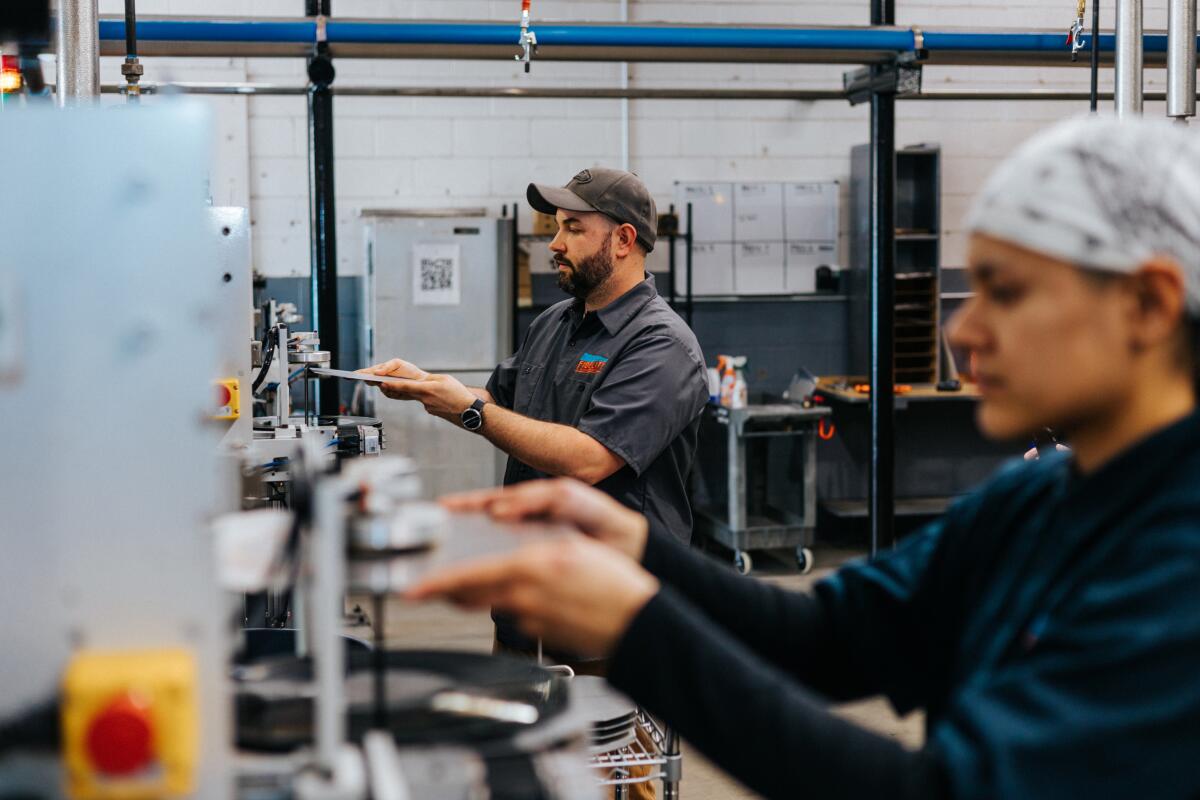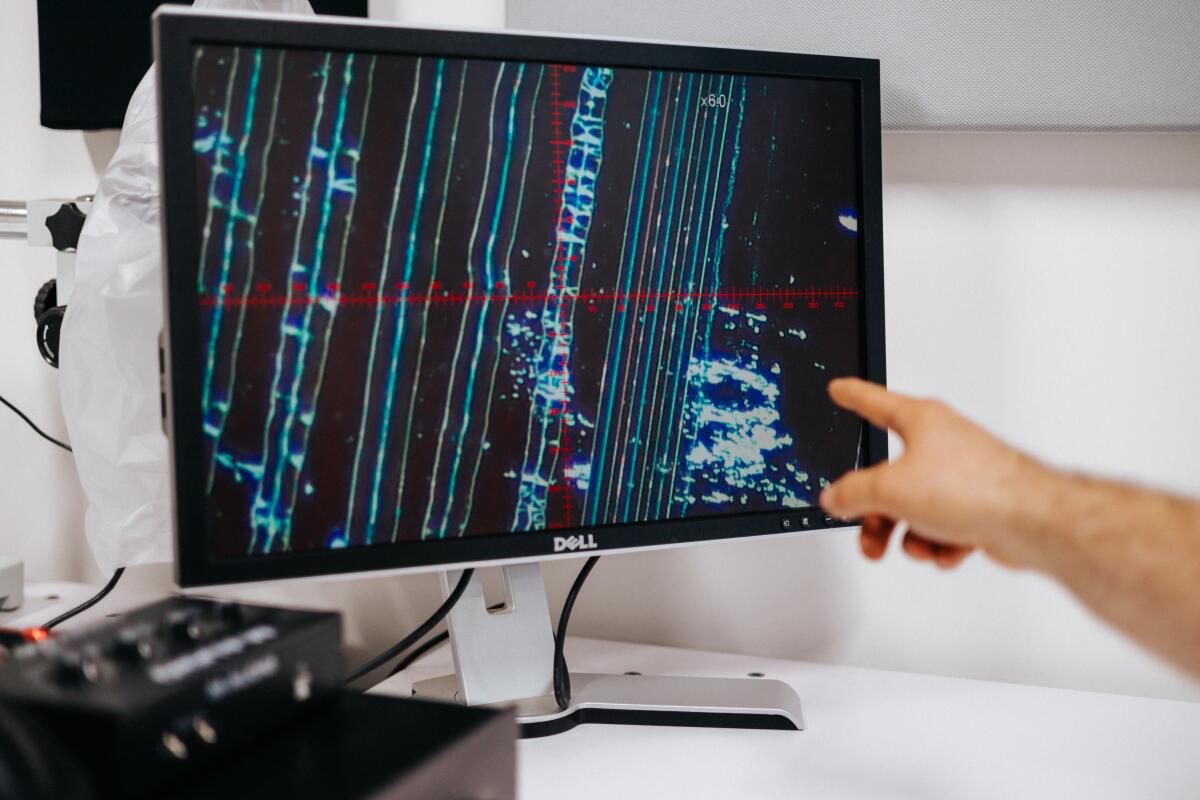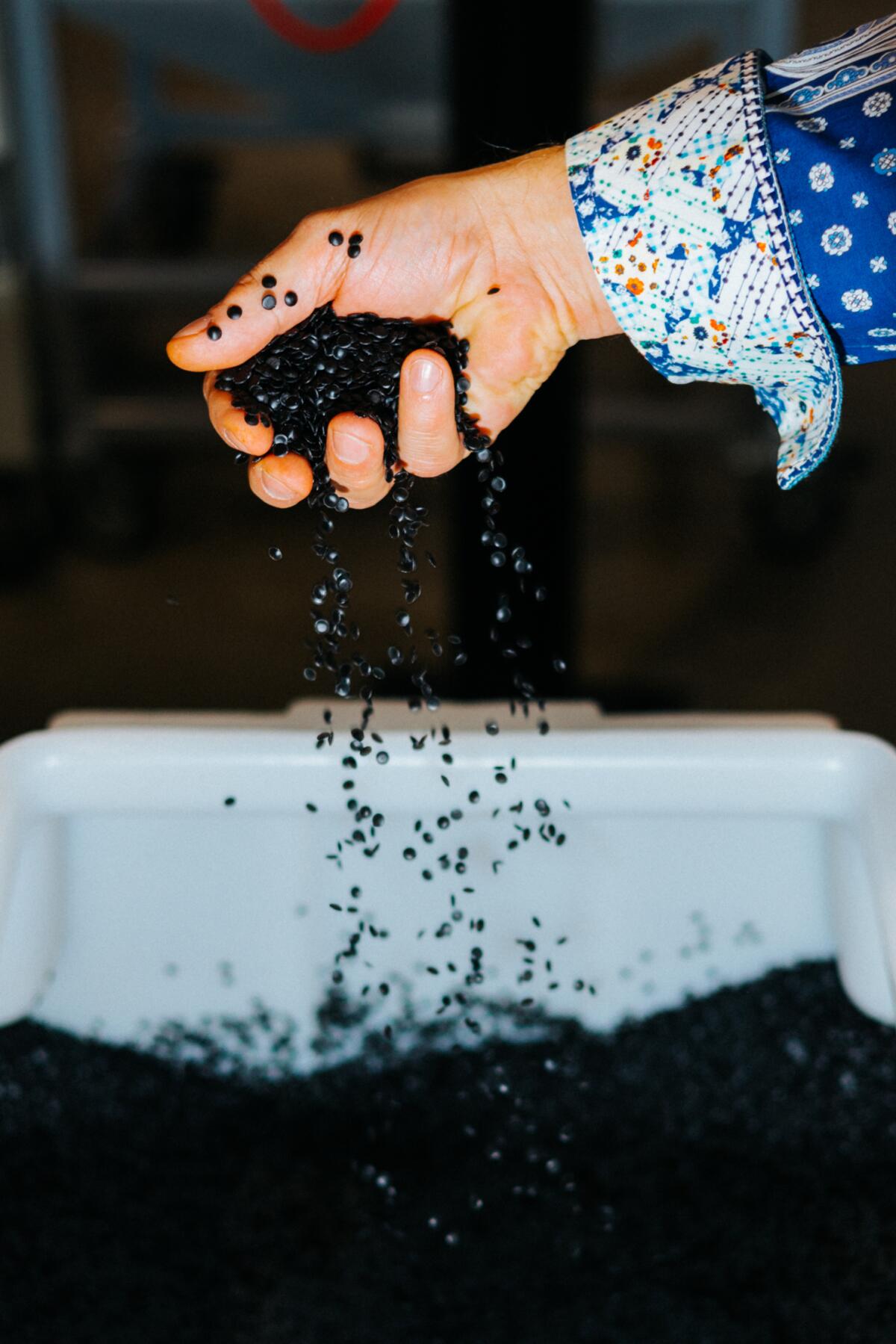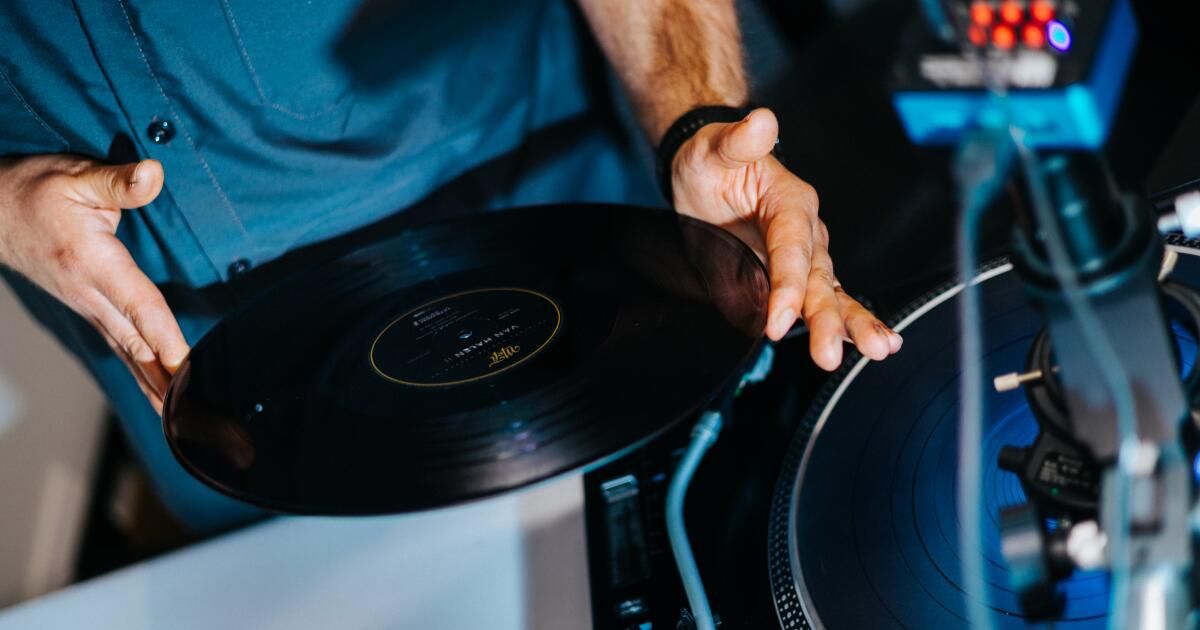The extruder melted thousands of tiny black granules into a goo. A linebacker-sized whistling machine, one of 12 like it in this Oxnard warehouse, shaped it into a puck-sized plastic “cookie.” A press stamped it into a thin, engraved disk and removed the rough edges, while a second arm reached down and struck it with a paper sticker.
When the machine finished its work, a hard rock fan somewhere in the world would have a new, pristine copy of “Van Halen II.”
“We're basically making a waffle here,” said Rick Hashimoto, owner of the new Fidelity Record Pressing, as he tapped his custom replica of a decades-old SMT vinyl press last week.
This Van Halen LP was one of hundreds that would be packaged and shipped on the first day Fidelity was open to the public. The plant's family of founders (two generations of Hashimotos who have endured vinyl boom-and-bust cycles) believe it is the first major plant to open in California in decades (a much smaller boutique printer, Onyx, opened in Arcadia in 2023).
Jim Davis and Rick Hashimoto of Fidelity Record Pressing.
(Chiara Alexa / For The Times)
Their investment is a big bet that the vinyl resurgence of the last decade will continue to be a formidable part of music consumption. To meet new demand, a long-standing element of Southern California's music economy is being revived.
“This is pretty much a completely new version of the same press I used in the '70s,” Hashimoto said. “That's pretty much how we've made records for 70 years.”
Vinyl, while not a threat to overtake streaming in the music economy, has seen steady growth for years. According to Luminate, in 2023 American music fans purchased 49.61 million albums on vinyl, up 14.2% from 43.46 million in 2022. It was the 18th consecutive year of growth for vinyl in the US . and the best for vinyl album sales since Luminate started tracking. data for that format in 1991. In 2020, vinyl surpassed compact discs as the dominant physical format.
Taylor Swift is responsible for much of that. The “Tortured Poets Department” singer sold 3.48 million LPs across her entire catalog in 2023, representing one in every 15 records sold in the U.S. in 2023. Other big sellers also included Lana Del Rey, Olivia Rodrigo and Tyler, the Creator.

Fidelity Record Pressing is the first major new vinyl plant to open in California in 40 years.
(Chiara Alexa / For The Times)
With pop artists like Swift cutting multiple LP pressings to encourage collectors, plus a constant rotation of expensive back catalog reissues, vinyl pressing demand has already outstripped capacity. Record labels have endured enormous wait times to record their albums. The trade suffered another blow with the 2020 closure of Canoga Park's 80-year-old Rainbo Records, which pressed everything from World War II-era audio lyric LPs to troops and Childish Gambino albums .
After Rainbo closed, “There were nine to 12 month waits to get something pressed,” said Jim Davis, co-founder of Fidelity and head of audiophile products outlet Music Direct and reissue label Mobile Fidelity Sound Lab. Vinyl hasn't really changed in 50 years, and many of the companies that used to manufacture and service the equipment have steadily disappeared. Only a devoted analog maniac like Jack White could find the time and means to open a plant like his Third Man Pressing in Detroit.
For Hashimoto, who spent 48 years on and off as a plant manager for Camarillo's Record Technology Inc., the time was right to bet on the future of the old format. Vinyl is a family business: his sons Edward and Alex work with him at Fidelity. “It will be in good hands. There is vinyl in Hashimoto’s blood,” he said. “Even after I finish the day here, I still go home and listen to records.”
At the Fidelity factory, amid the hum of the presses, it is striking how handmade the final product is. One worker physically inspects each LP that comes off the press, checking for scratches or errors, while another manually inserts the vinyl into the sleeves. Hashimoto's son Alex has a lab where he looks at the grooves on a record under a microscope to control quality. “Right now I'm checking the runout slot to see how much runout there is,” he said. “There's something exact physical that makes this music happen on the equivalent of two sheets of paper.”

A worker inspects the grooves on a vinyl record at Fidelity Record Pressing.
(Chiara Alexa / For The Times)
For serious audiophiles, Fidelity's innovations, like a proprietary vinyl mix with an ultra-low noise floor, could make it the first stop for top-of-the-line pressings. “They're still figuring out ways to improve this process,” said Andrew Jones, the legendary Los Angeles speaker designer who visited Fidelity's grand opening last week. “There's a lot more ritual involved with vinyl, it connects mindfulness to music.”
Fidelity is printing about 10,000 LPs per week and hopes to increase to 40,000 in the coming months. The plant's capacity is a boon for the industry: On opening day, a representative from the Disney record company was already exploring the facilities. Until now, the only obstacle has been finding young workers to train them in a very old industrial trade. “It's very difficult to find someone who pays attention to details,” Hashimoto said.
Fidelity is released at a difficult time in the record business. Since streaming has wiped out most artists' income from recorded music, vinyl sales can make a real difference. The RIAA calculates 1,500 views as equivalent to the sale of an album, which on Spotify will earn the artist a little more than $3. Vinyl LPs, on the other hand, typically sell for between $20 and $30, and their sales also support companies like beloved independent record stores.
But younger artists are increasingly aware of the environmental costs of moving tons of collectible vinyl. In a recent interview with Billboard, Billie Eilish lamented “how wasteful it is” that “some of the biggest artists in the world make 40 different vinyl packages that have something unique and different just to keep you buying more.” (She later pointed out that she is as guilty of this as anyone and that it is a global problem to solve.)
The Fidelity team admits they struggle with this issue as well; They spent years designing custom water cooling and recycling systems to keep utilities as minimal as possible. They believe that the best vinyl LP is one that is done right the first time and can be passed down from generation to generation.

Vinyl pellets that will be turned into LPs at Fidelity Record Pressing.
(Chiara Alexa / For The Times)
“We try not to look at records as commodities,” Davis said. “But merchandising of all kinds is very important to artists today, and what is more important than the music itself?”
“There has to be a balance,” Hashimoto said. “We really try to be as socially conscious as possible. “We reuse everything possible, from water to vinyl.”
Beleaguered major label managers and independent artists trying to break even on tours will no doubt welcome Fidelity's new production capacity. But they are still a small corner of the business: streaming represents 84% of the recording industry. “I don't think vinyl will ever surpass streaming. I think this status quo will remain for a while,” Hashimoto said.
That's fine with him. “It's a niche and he will continue to be a niche,” he said. “Because this ritual requires more commitment.”












